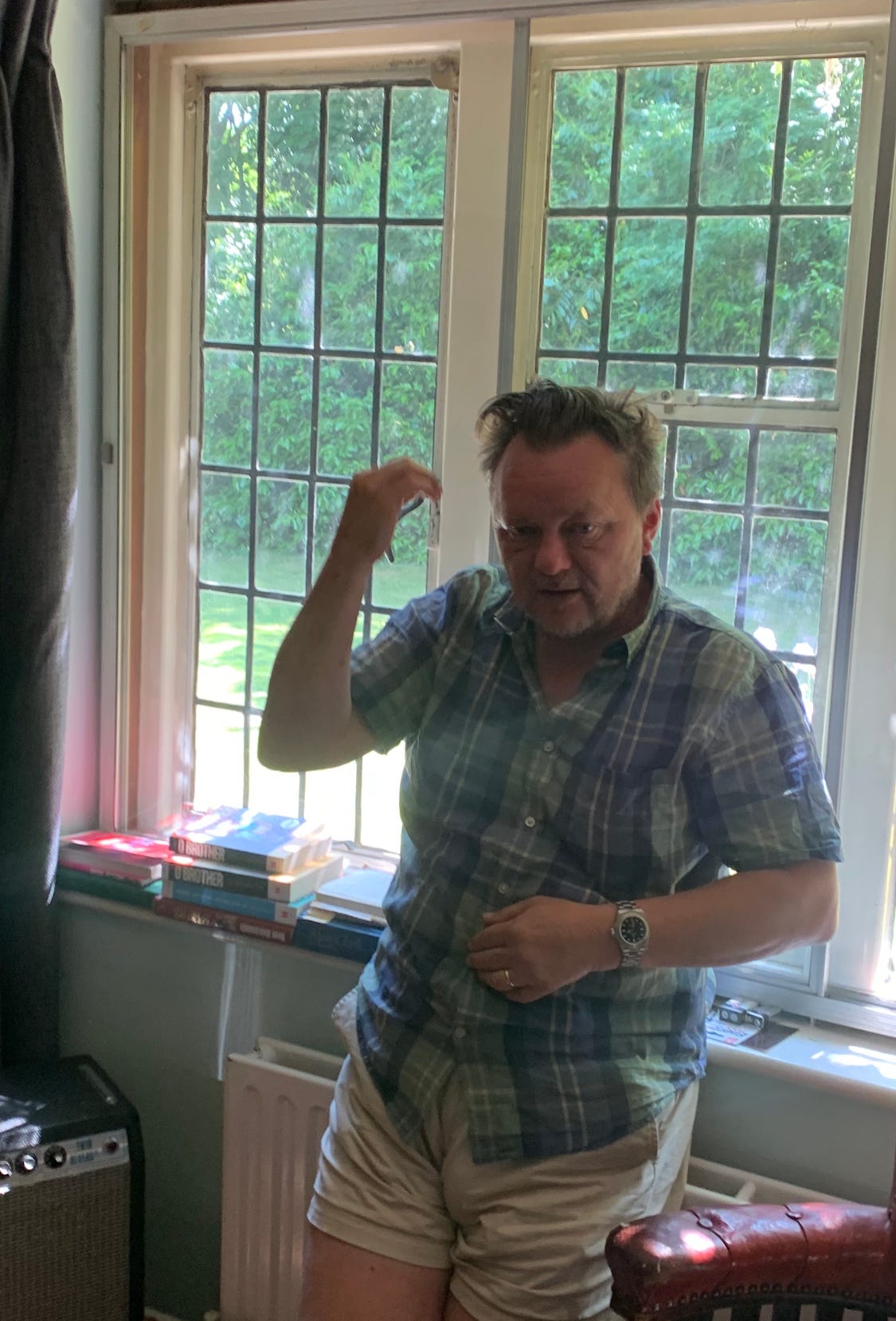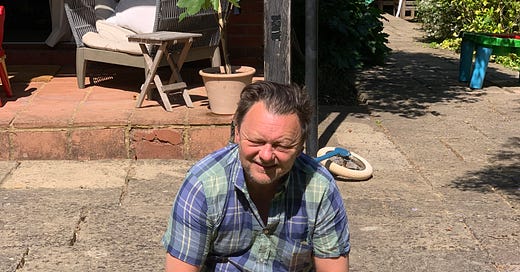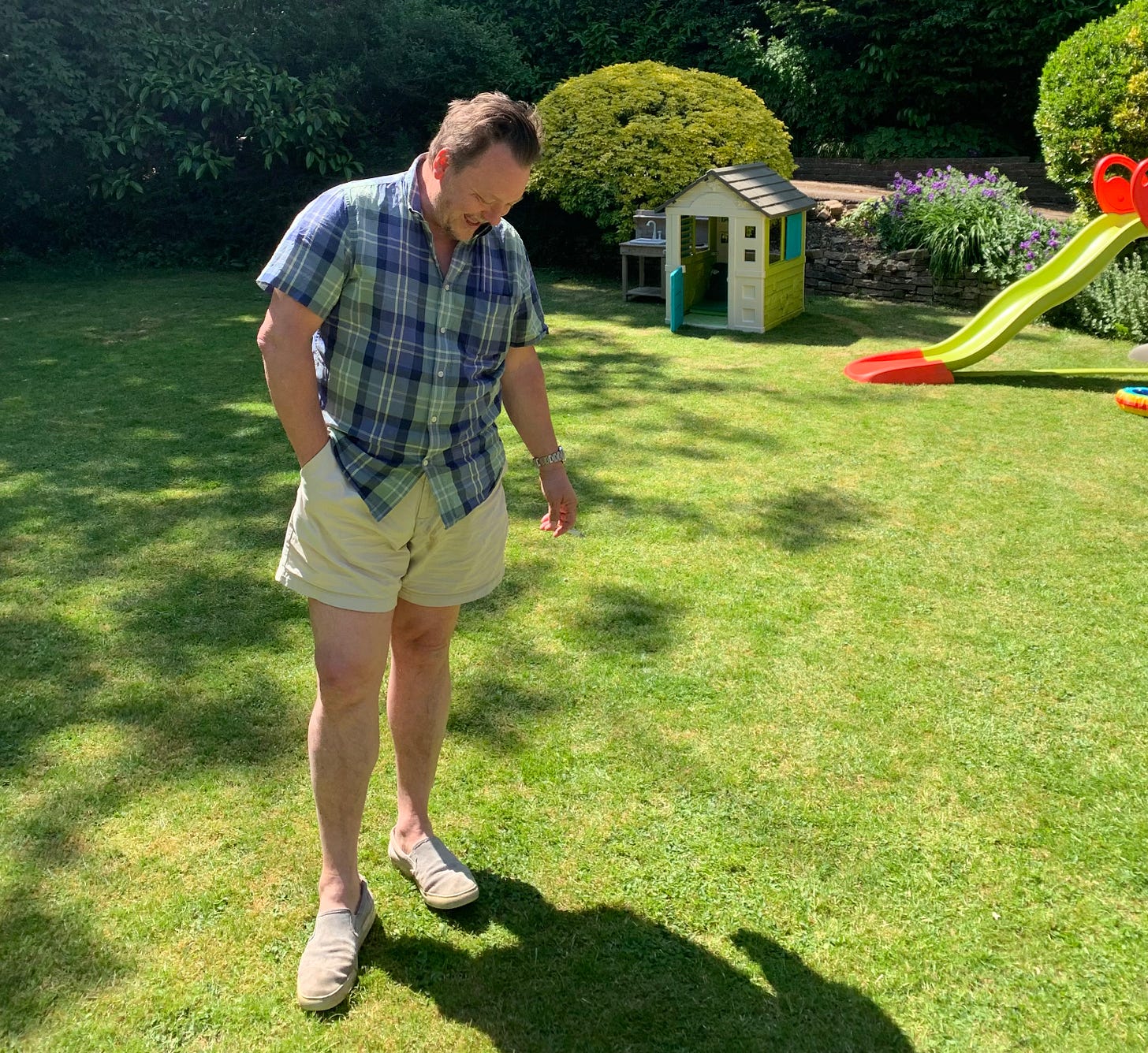'The half-life of questions is very powerful. It's a Chernobyl of the soul.' O Brother, John Niven's bestselling memoir of his brother, Gary, who killed himself, is scabrous, hilarious and poignant
The author of 10 novels and Hollywood screenwriter speaks as vibrantly as his prose is raw about sibling love and the tragicomedy of life
the marmalade dusks
and the bubbling saxophone
underpinning everything
O Brother
John Niven exudes a life-force that invigorates. There is the ribald sense of humour; the sharp, self-knowing take on the world. An enticing roguishness which promises that if you stick around long enough then after discussing the merits of the semi-colon and Martin Amis’s late novels the action will move onto a scrape to remember.
A native of Ayrshire’s Irvine, Niven lives in a stunning house in Buckinghamshire with his family, and he writes. Beautifully. Viscerally. Comically. Poetically.
O Brother is poetry as the baring of who we are, what makes us us, and what comes calling in the dark of night when there is nowhere else to hide, flee to.
The memoir reads like a novel, meaning it is multi-layered, offers plot and story, and, most of all, a slew of characters who linger in the consciousness after encountering them.
At centre is a searing recounting of the relationship between Niven and his younger sibling Gary - ‘Shades’ - who was a chancer, a drifter, a small-time drug dealer, a handsome diver and ducker who like many souls born to the world arrived lost and yearned to find what everyone seeks but who, like too many, never landed in the place of light and love, care and safety.
Home.
Early in the memoir Niven recalls his mother, Jeanette, saying of her son:
‘Gary always wanted what he wanted.’
If character is destiny then Shades, sadly, may always have been headed down the one-way street to an oblivion that occurred 13 years ago.
In the early hours of Tuesday, 31 August, 2010, Gary - Niven’s junior by two years - was admitted to University Hospital Crosshouse, near Kilmarnock, having rung emergency services after trying to kill himself at his house in Irvine, the Glasgow-overspill 1960s new town he was born in and never left.
By circa 7am, and assessed as low-risk, Gary was left in a room alone on a ward and tried to hang himself. Unconscious when discovered, he was placed in a medical coma, intubated in intensive care, and never awoke. Gary was 42.
Speaking one sunny day this summer in a comfortable book-lined study that has deep armchairs, a vast Victorian-era writing desk, and is stuffed with guitars, amps, first editions, proofs and promo posters for movies written by Niven, he says: ‘The novel I was publishing at the time was Straight White Male, which came out three years after Gary died, so a lot of how I was feeling about that got processed into a female character - the sister of the protagonist in that novel, Kennedy Marr, who was a drug dealer who killed herself.'
‘A couple of people would say to me over the years, "It kind of feels like there might be a book in [Gary’s death].” I wasn't quite ready to go there yet. People always say, "Oh, it must have been so emotional writing this book."
‘It doesn't really work like that if you're a writer. It's a bit of the Graham Greene thing going on - the “chip of ice in the heart.”
‘Though when I did a reading of it publicly for the first time recently I did get to a line and I thought: "Am I going to get through this?" It's tough sometimes when you verbalize it.
‘But the writing process was more difficult technically than it was emotionally. I'd rather write 10 more fucking novels than one more of these.
‘I don't know about you, but my mailbox and desk gets clogged up with memoirs, whether it's from the bass player from some indie band or whoever. To write a memoir, you really have to either have a fantastic angle or be someone of note.
‘If you're Mick Jagger, I want to read about when you did the milk round when you were eight. If you're not that big I'm like, "Fuck off."
‘I get sent a lot of really badly-written memoirs that are structureless. They're basically a list of everything that happened to the person from birth until typing the last sentence of the book, and it really tries my patience. With this, after my brother killed himself, I kind of knew that I'd write about it one day.
‘Experience takes a few years to distill until you can write about it. Any events, before you can put them into a novel, you need three or four years. Big stuff, main events, whether that's the death of a parent or suicide of a sibling - it's even longer until you really get a handle on it.
‘In a way, I've been working on this book since 2010, and then exclusively for the last three years, pretty much all I've been doing. I've been through God knows how many drafts. It was originally a lot longer. The first draft was about 160,000 words.
‘Once I have the voice of the character in fiction, I find it much easier and more freeing. With nonfiction, to sustain an interesting voice for a long time - I found hard.
‘I only felt able to publish the book when I suddenly realized what the structure of it would be. It was almost a week, five days, my brother was in a coma for before he died.
‘So the present of the book would be the week of the coma - as we uncovered a lot of things that were going on in his life that we didn't know about, a lot that [actually] we still don't know about. Then, use jumping-off points from there to go back to moments from our childhood.’

Niven has published nine novels, plus his 2005 fiction debut, the novella, Music From Big Pink, the eponymous title of The Band’s 1968 seminal album.
He had previously quit a lucrative music industry job to chase his dream of being a writer and money was scarce. ‘I left the music business in 2002. Big Pink came out in 2005, so for three years there was very little hope. Even then, 2005, I wasn't making a living. Then Kill Your Friends was published in 2008 and started paying. Things turned up little financially.’
Kill Your Friends hit seismic: published by Heinemann, Niven sets the novel in 1997, when Britpop held the cultural zeitgeist, the story drawing on his own career as a ‘terrible’ A & R executive who failed ‘upwards for the best part of ten years’.
It is a hilarious, thrill-riven ride of a yarn. Less than a decade later, Niven penned the screenplay for the 2015 movie version, which starred Nicholas Hoult as Steven Stelfox, the novel’s protagonist.
He says: ‘We reprinted, I think, four or five times in the first six weeks of publication. Within two months, you're up to 20,000 copies. At that point in, you have a hit.
‘I look back at that book now and it's quite crude. I don't mean crude as in filthy, I mean crude technically. It's a voice novel, like Money by Amis. All you've got is the voice of character. If that works, you could be okay. If it doesn't, you’re fucked. I don't think you'd get it published now.’
A prime narrative strand of O Brother tells of Niven’s struggles to be a successful novelist - on and off the page - and how this intertwines with the family in Irvine that, alongside Gary, features Jeanette, father, John, and younger sister, Linda.
Niven’s life had echoes of Gary’s. ‘I'm earning a good living and I'm working in "a respectful industry”,’ he says. ‘I'm driving a nice car and I've got a mortgage and a house. But I'm fucking out of control too. The thing I realized later was what was making me miserable and out of control was the fact that I was terrified that I wasn't doing what I was meant to do.’
Which was fiction. O Brother, from one perspective, is an account of how self-realisation is the key to contentment. Niven achieves this, Gary does not. Its importance is suggested to Niven, and how ‘self-awareness’ and ‘self-care’ should be taught on the school curriculum.
He answers by citing a close friend. ‘Irvine Welsh has been big on this for years. He said at some point we're going to have to move to a sort of universal wage for people because of AI. Eventually, no one’s going to have a job, right?
‘[This means] you're going to have to give people a living wage to do nothing. So then you're also going to have to teach them how to fill the time not working - having the mental resource to enjoy that time.’
Niven can certainly amuse himself as his twitter/X account, estelleconstanza, illustrates via a Rabelaisian tone that mercilessly satirises the dull, the ridiculous, the mean and the pompous which populate the platform.
For this reader, perhaps the most vivid part of O Brother is when Niven, honest to the marrow, describes himself going off the rails during a phase of life that features The Clash co-founder, Joe Strummer, as a cocaine-snorting partner.
In a plunging spiral of drink, powder, and Thursday-to-Monday benders, Niven often drives drunk and wired from London back to home along the M40.
One time his luck runs out and Niven loses control, hits the crash barrier, and is picked up and processed by the police.
Later, in 2003, after leaving London Records, he hits a nadir, of which Niven writes:
‘I am penniless, living with my girlfriend’s mum.
‘I have an eight-year-old son I cannot support.
‘I am finished.’
At this time Gary was on his own, contrasting upward trajectory: the most fulfilled period of his short life.
Niven says: ‘The funny thing writing the book was that I didn't realize how much my story and my brother’s crossed over. He had a moment from around the late ‘90s to 2002 or 03 where he met a nice girl.
‘He's one of those blokes who, I think, couldn't run a life. The whole thing of paying bills and tax and mortgage and council tax - he couldn't do it.
‘With this girl he was with they bought a house and she was running everything. He was working in Amsterdam at a construction site and earning quite good money. They got engaged. It was all going, for three or four years, really well for him.
‘That was, if you're writing a drama, a parabola exactly [how it should intersect] with my own when reaching the lowest point in my life because it was exactly where I was when I'd left the music industry, wasn't getting published, no chance of getting published at that point. It was absolutely graphic. We crossed over exactly.
‘Then it was literally his life started going to shit in 2007, which is exactly when I was signed with Heinemann and mine started going upwards. You couldn't have plotted two character curves as dramatic. Mental.’
Perhaps most of all, O Brother is an ode to love - primarily Niven’s for Gary and Jeanette, John Snr, Linda and, beyond, for the living of a fulfilled life.
Unhappy regarding the circumstances of Gary’s death Niven seeks to uncover as much of the truth as he can, refusing to be denied when Crosshouse Hospital obstructs him, or when one or more of his freedom of information requests are refused, doing so to honour the memory of Shades, and to try and achieve some kind of peace for his mother, sister, and himself.
Yet guilt haunts. ‘My sister read the proof the other week, after having earlier read a draft. She rang me up crying. She said, "I never realized till I read this for a second time, but you and Gary were close when you're kids."
‘Of course, we were. We're boys that were only two years apart - it started to bifurcate in our teens. We were all close as kids. I felt very protective of them and that never goes away. Part of the book, certainly the second half, is I do wind up examining guilt in relation to it. There was a lot of guilt, you know?
‘A lot of the book was happening nearly 13 years ago. I don't think the men's mental health conversation was quite as front-stage as it is now. I wish it had been. I mean, the Samaritans did the Men on the Ropes campaign a few years after Gary died. I remember looking at that and think, "Fuck."
‘There's a scene in the book where I'm having lunch with Gary in London. I think: “Well, do your research and you figure out what you really want to do and you crack on with it.”
‘Life ain't fucking like that for a lot of people who might be broken with medication and debt. Just getting through the day is enough. I'm lecturing my brother on how to get his life back on track, and I realized later: Jesus Christ, every red light in the instrument panel was lit up flashing bright red. He was single, he was 42, the median age for male suicide.
‘I don't know if it's right or not - feeling guilt. You're going to feel it [anyway] with somebody close to you who killed themselves. It says in the book that the half-life of the lingering questions is very powerful and go on for a long time. It's a Chernobyl of the soul.
‘It's unending because you're always thinking: "If we'd done that, if we'd just given them that a little bit of money, if you could've gotten them through that one night, would they have turned the corner?"
‘In my heart, I think: "Possibly not," you know? I said to my sister, "Maybe I should just have put him on a retainer." Effectively said, "Look, I'll send you X every month to help you out."
‘Linda rightly went, "Look, John, we'd just end up one month and he'd need double that because some drug deal had gone wrong or he'd need more. He would just took it up and it would've been endless.”
‘At what point does it become enabling?’
Niven blesses his fortune to have been born with a talent and the self-determination which drove him to create an alternate, rewarding life.
‘I remember before Kill Your Friends came out, I was thinking if I could make a teacher's salary out of this - what, 30,000, 40,000 a year? - I would be fucking over the moon.
‘My agent at the time said: “Actually that's not going to happen.”
‘I said: “What do you mean?”
‘He went: “You're going to get rich or fucking nothing."‘
Niven laughs - yet again. A rich, warm sound that fills the afternoon like the pages of O Brother will fill your heart.





